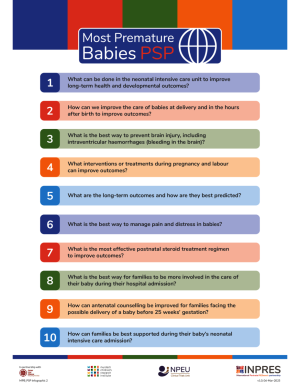Research priorities for the most premature babies born less 25 weeks gestation identified by an international priority setting partnership

Published on Wednesday, 16 July 2025 Post
The results of the Most Premature Babies Priority Setting Partnership (PSP) have now been published in Archives of Disease in Childhood (Fetal and Neonatal Edition). Using methodology established by the James Lind Alliance (JLA) the Most Premature Babies PSP identified and prioritised evidence uncertainties or 'unanswered questions' relating to the most premature babies born before 25 weeks gestation (about 4 months early).
To our knowledge, this is the first JLA PSP of its kind to address this high-risk population and is unique in encompassing the parent–infant dyad rather than a specific disease. Given their significant rates of mortality and adverse health and developmental outcomes, infants born <25 weeks' gestation are an under-researched group.
Healthcare professionals caring for preterm infants, and people with lived experience of neonatal intensive care across Australia, New Zealand and the UK were involved in an initial survey, launched in October 2022. 311 respondents were asked 'What questions would you like to see answered by research, focusing on the care and treatment of the most premature babies born before 25 weeks gestation, and/or the mental health and wellbeing of parents and carers of the most premature babies?' 844 responses were reviewed to generate a long-list of 80 'unanswered but answerable' summary questions. The questions were split into parallel categories depending on whether they related to the care and treatment of the most premature babies born before 25 weeks gestation, or the mental health and wellbeing of parents and carers of the most premature babies.
A second shortlisting survey was disseminated in September 2023 to prioritise the identified uncertainties. The most highly ranked questions in each category (19 in total) were taken forward to the final priority setting workshops. In December 2023, 30 healthcare professionals and people with lived experience ranked the shortlisted questions in online workshops. The top 10 questions for research were determined by the group collectively. There was significant overlap of shared priorities between people with lived experience and healthcare professionals in the top priorities – the top 7 ranked questions were the same, albeit in a different order. Additionally, there was a strong theme among healthcare professionals' priorities relating to clinical management of the infant, whilst people with lived experience voiced themes of parental and family support. The range of questions included in the top 10 priorities reflects the complex and nuanced needs of infants <25 weeks' gestation and their families. A further workshop in October 2024 discussed which of the unanswered questions could be made amenable to answer within a clinical trial or program of research, and potential funding avenues were identified. The findings of this PSP should be used to guide future research and funding aimed at improving meaningful outcomes for the most premature infants and their families.
You can read the full publication here:






